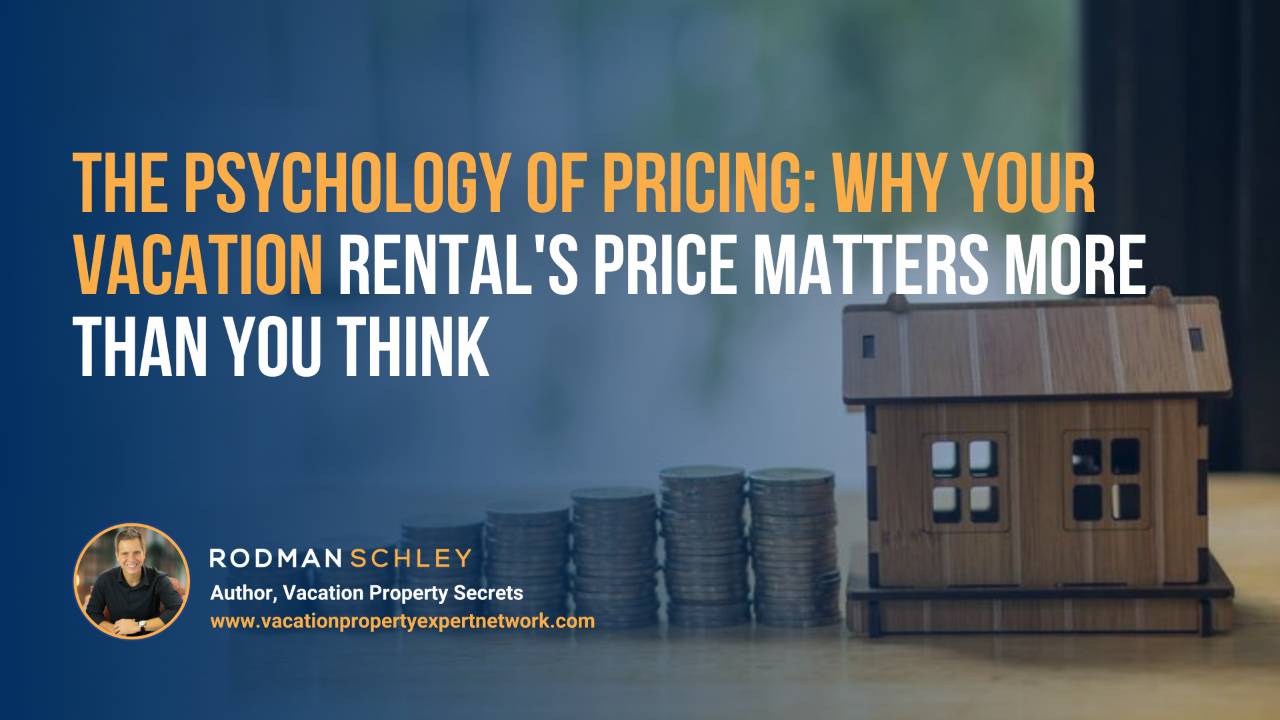
The Psychology of Pricing: Why Your Vacation Rental's Price Matters More Than You Think
Setting the right price for your vacation rental is one of the most crucial decisions you’ll make as an investor. While it’s tempting to simply look at competitors or follow industry guidelines, the psychology of pricing goes far deeper than just numbers. The price you choose doesn’t just impact your revenue—it also influences potential guests’ perception of your property, its desirability, and ultimately, your profitability.
In this blog post, we’ll explore how the psychology of pricing can impact your vacation rental business. From how pricing shapes consumer behavior to strategies you can use to price your property effectively, understanding the deeper psychological factors at play will help you set a price that maximizes your rental income without leaving money on the table.
The Psychological Impact of Price on Consumers
Consumers often perceive price as more than just a number—it reflects a product’s quality, value, and even status. When it comes to vacation rentals, guests don’t just look for the best deal; they’re also looking for a property that aligns with their expectations of comfort, luxury, and experience. Here’s how pricing psychology plays a role:
One of the most powerful psychological pricing principles is the anchoring effect. This occurs when the first price a consumer sees becomes a reference point for evaluating subsequent prices. For example, if your vacation rental is listed at $300 per night, and guests see a competing property priced at $400 per night, they may perceive your property as offering better value, even if the actual difference in amenities or quality is minimal.
On the flip side, if guests initially encounter a lower price point—say, $150 per night—then a price of $200 per night might seem overpriced, even if it’s still reasonable for your property’s quality and location.
Tip: Use higher-priced competitors or premium packages as a reference point to make your property appear like a better value in comparison.
The price of your vacation rental can directly influence guests’ perception of its value. If your price is too low, it could signal to potential guests that your property is lower quality or lacks desirable features. People tend to assume that low prices correlate with lesser quality, which can deter high-value customers from booking with you.
On the other hand, if you price your property too high, guests may assume they’re paying for something that doesn’t live up to expectations, leading to dissatisfaction, negative reviews, and ultimately, reduced bookings.
The key is to strike a balance where your price reflects the true value of your property while also appealing to guests’ desire for a great deal. You want your guests to feel like they’re getting premium accommodations at a fair price.
The decoy effect is another psychological principle that can influence booking behavior. By offering multiple pricing options, you can guide guests toward choosing a specific price point. For example, if you offer three rental options:
- Option A: A basic room for $100 per night
- Option B: A premium room for $200 per night
- Option C: A deluxe room for $220 per night
Option C, the most expensive, serves as a decoy, making Option B seem more attractive. Guests who would have otherwise considered the cheaper option are more likely to book the middle-tier property because it seems like the best value for money when compared to the more expensive one.
Tip: Use the decoy effect by offering a mid-tier package with amenities that make it seem like the best deal, while still offering an ultra-premium or budget option for guests with varying preferences.
The Power of Price Perception: How to Set Your Price
Understanding price perception is essential for optimizing your vacation rental's pricing. The goal is to set a price that feels fair and justified based on the property’s quality, location, and amenities. Let’s look at a few strategies for leveraging price perception:
-
Price Ranges and Ending Prices
The way you display prices can have a profound impact on guest behavior. Research shows that prices ending in “9” (e.g., $199 instead of $200) are perceived as cheaper than they really are. This is because consumers have a tendency to focus on the leftmost digit, so $199 feels significantly cheaper than $200 even though the difference is only $1.
Additionally, price ranges can help guide guest expectations. For example, if your price range is listed as $200-$250, it suggests that the property is within a premium range but still offers some flexibility in pricing.
Tip: Consider ending your prices in “9” or setting a price range to enhance the perception of value. For instance, $199 per night could feel like a much better deal than $200 for the same room.
Offering discounts and promotions can trigger a sense of urgency and increase bookings, but it’s important to do so strategically. Guests are more likely to make a booking when they feel like they’re getting an exclusive offer or a limited-time deal. However, constantly offering discounts may lead to the perception that your property isn’t worth its full value.
To maintain a strong price perception, consider offering discounts for early bookings, long-term stays, or repeat guests. This allows you to increase occupancy while preserving the integrity of your price.
Tip: Implement dynamic pricing to offer discounts during slower periods, but always be mindful of the perceived value of your property.
Pricing is not just about numbers—value perception is equally important. If your price is high, guests need to feel that the property is worth the cost. To justify a higher price point, highlight the unique selling points (USPs) of your property:
- Location: Proximity to popular attractions, beaches, or nature reserves.
- Luxury amenities: Private pools, hot tubs, or high-end furnishings.
- Exclusive experiences: Local tours, concierge services, or access to private events.
By showcasing these USPs, you can justify a higher price and make guests feel they are receiving something special for the price they’re paying.
How to Find the Sweet Spot: Price Optimization for Vacation Rentals
Finding the optimal price for your vacation rental requires a combination of market research, psychological pricing strategies, and ongoing adjustments based on demand and competition. Here are some tips for setting and optimizing your vacation rental price:
-
Market Research
- Analyze competitors: Research similar properties in your area to understand what they are charging. Look at properties with similar size, amenities, and location to get an idea of the going rate.
- Understand local demand: High-demand areas or tourist hotspots may justify higher pricing, especially during peak seasons. Conversely, areas with lower demand or off-season periods may require price adjustments to attract guests.
- Analyze competitors: Research similar properties in your area to understand what they are charging. Look at properties with similar size, amenities, and location to get an idea of the going rate.
-
Experiment with Pricing
- Test different price points: Experiment with varying price points to find what works best for your property. Monitor your occupancy rates and guest feedback to identify the most effective pricing strategy.
- Use dynamic pricing tools: Leverage dynamic pricing software that adjusts your price based on demand, competitor pricing, and other market factors.
- Test different price points: Experiment with varying price points to find what works best for your property. Monitor your occupancy rates and guest feedback to identify the most effective pricing strategy.
-
Consider the Total Experience
- Guests are not just paying for a room—they’re paying for an experience. Whether it’s a beachfront villa, a secluded cabin, or a luxury apartment, the experience your vacation rental provides should align with the price you set. Consider adding additional services or creating personalized experiences to increase perceived value.
Conclusion
The psychology of pricing plays a significant role in the success of your vacation rental. Setting the right price goes beyond just choosing a number—it involves understanding consumer behavior, leveraging psychological pricing techniques, and continually adjusting your price to reflect value. A high price isn’t always a bad thing, but it must be justified by the experience and value that your property offers.
By considering pricing psychology and using strategies like dynamic pricing, value-focused marketing, and psychological price anchoring, you can set a price that maximizes your revenue while maintaining strong guest satisfaction and long-term success in the vacation rental market.
Happy pricing, and may your vacation rental bring in both satisfied guests and steady profits! For more tips and insights on vacation rental investment, check out the Vacation Property Expert Network:👉 www.vacationpropertyexpertnetwork.com.







